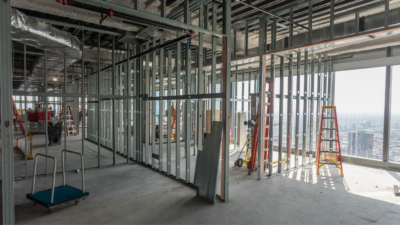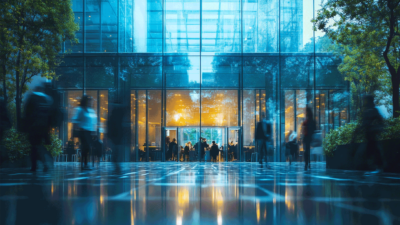In this article, we examine the current context of the U.S. office market and highlight the key performance indicators in the fourth quarter of 2019.
The U.S. office market posted a solid fourth quarter. Occupancy held firm, rents increased and net absorption saw a modest rise.
Construction reached a new record high. Any supply concerns remain localized and submarket specific. Suburban markets continue to see the greatest share of capital being placed.
Vacancy Remains at a Record Low 
- The U.S. office vacancy rate held firm in Q4 2019 at a record low of 11.4%. Vacancy has now been below its historic average for 20 consecutive quarters.
- Central business district (CBD) vacancy rates fell by 20 basis points in Q4 2019 to 10%, while suburban levels rose slightly to 12.1%.
- Major and mid-tier metros with the lowest vacancy rates include Nashville, Orlando, Pittsburgh, the San Francisco Bay Area and Seattle.
Rents Inch Upwards
- Average Class A office CBD asking rates grew by 0.3% in Q4 2019 to $50.35 per square foot, while suburban rents rose by 0.5% to $31.40 per square foot.
- Over the past 12 months, 17 CBD markets saw Class A asking rents rise by more than 5%, led by Tampa Bay, Atlanta and Charlotte.
- In the suburbs, nine markets saw Class A rents rise by more than 5% over the same time period. Charlotte, Pittsburgh and Seattle were among the leaders.
Absorption Stays Positive
- U.S. office absorption rose in Q4 2019 to 12.3 million square feet, up from 10.4 million square feet in the prior quarter.
- CBD markets accounted for two million square feet of the Q4 2019 net absorption total, with 10.3 million square feet occurring in the suburbs.
- Markets with strong positive absorption in Q4 2019 included Boston, Dallas, Denver and Phoenix.
Construction is Still Rising
- The amount of office space under construction in the U.S. stands at a record 161.1 million square feet. Construction peaked at 125.2 million square feet in the prior cycle.
- Development activity is led by New York and the San Francisco Bay Area, which both have more than 20 million square feet underway.
- The fastest growing markets are Austin, Nashville and Salt Lake City.

Suburban Markets Lead Sales Activity
- Average capitalization rates (cap rates) stand at 6.5%, 20 basis points lower than one year ago. CBD cap rates fell by 30 basis points over the same time period to 5.3%, while suburban cap rates held firm at 6.8%.
- Sales volume in Q4 2019 totaled $40 billion, down by 6% year over year. However, annual capital placed, at $139.7 billion, was up by 2% from 2018.
- Investors continue to favor suburban assets, placing $24.5 billion in the fourth quarter, compared with $15.5 billion in CBD locations.
For more insights, stay tuned for our Q4 2019 Top Office Markets Report and our full Q4 2019 Office Market Outlook Report, both to be published soon.
About the author:
Stephen is the National Director of Office Research for Colliers International, where he focuses on analyzing office property trends, compiling Colliers’ thought leadership and delivering timely market projections to provide clients with a leading edge in our industry.

 U.S. National Research
U.S. National Research
 Gary Gottlieb
Gary Gottlieb Darren Lemmon
Darren Lemmon Phil Breidenbach
Phil Breidenbach Marianne Skorupski
Marianne Skorupski Michael Lirtzman
Michael Lirtzman

 Aaron Jodka
Aaron Jodka